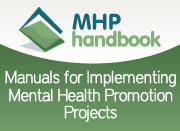Tools
- Utilities:
- Print this page
- Send this page
- Font size:
- Increase font size
- Decrease font size
Setting the Agenda
Mental health is central to the human, social and economic capital of society - however, the incidence of mental distress and disease is increasing rapidly throughout Europe. It is estimated that mental health problems impact on about a quarter of the population at some time in their lives and at any point in time, are being experienced by 10% of adults regardless of culture or country.
Developing a mental health condition can be catastrophic for the individual and their families in health and social terms – it brings increased risks of persistent poverty, social exclusion and vulnerability to stigma and discrimination. The burden on society is equally severe in terms of lost productivity and treatment costs.
PROMENPOL’s Objectives
Recent reports indicate that the incidence and costs associated with mental distress and ill health are substantial and expected to rise globally in the next 15 years. Equally there is a rapid proliferation of solutions and responses at societal, organisational and individual level.
Against this background, PROMENPOL sets out to identify useful and practical approaches to the promotion and protection of mental health. It will develop a systematic multidimensional approach to identifying and classifying effective tools for promoting mental health across the lifespan. PROMENPOL will focus on tools that promote mental health for students in schools, the workplace and the older peoples residential homes.
What PROMENPOL Aims to Do
Working with both specialist and mainstream researchers, stakeholders, networks, professionals, practitioners and representative organisations PROMENPOL aims to:
- Identify and Re-Package tools for mental health promotion and protection within three contexts - schools, the workplace and residences for older people.
- Produce a systematic and easily navigated knowledge management system populated with useful information, key references and important web links.
- Construct a set of three mental health toolkits tailored to the life span stage of target users and predominant context within which they live their lives i.e. school, work and residences for older people.
- Organise a series of pilot implementation projects to evaluate and review the knowledge base and toolkits.
- Produce a set of multi-sectoral policy principles designed to promote and support more proactive and targeted mental health initiatives in each of the sectors.
- Create sustainable collaboration between the key actors in the project to carry forward the results into the later stages of the project and beyond.



